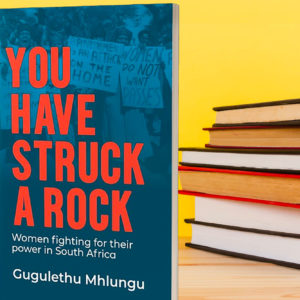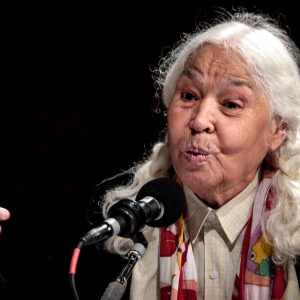New Books | Decolonising feminism
Women’s liberation has been co-opted by the forces it seeks to dismantle, but political theorist Françoise Vergès argues that a pluralist, decolonial version of it is worth salvaging.
Author:
30 August 2021

This is a lightly edited excerpt from A Decolonial Feminism (Pluto Books, 2021) by Françoise Vergès.
Taking sides
The turn in feminism, from being long condemned by right-wing ideologies, to becoming one of their spearheads, is worthy of analysis. What is at stake in this ideological deployment? How did this change occur? How did we move from a feminism that was indifferent or ambivalent to racial and colonial issues in the francophone world, to a white and imperialist feminism? What is femonationalism all about? How has feminism become, in a significant convergence, one of the pillars of several ideologies – liberal, nationalist-xenophobic, extreme right-wing – that, at first glance, are opposed to one another? How has the issue of women’s rights become one of the trump cards played by the state and imperialism, one of neoliberalism’s last recourses, and the spearhead of the civilising mission of white, bourgeois feminism? This feminism and these xenophobic-nationalist currents do not profess to having shared objectives, but they do share common points of convergence, and it is these that interest us here.
This book wishes to be a contribution to the critical works of feminists in the Global South and their allies in the North on gender, feminism, women’s struggles and the critique of civilisational feminism. I call this feminism “civilisational” because, in the name of an ideology of women’s rights, it has undertaken the mission of imposing a unique perspective that contributes to the perpetuation of domination based on class, gender and race. I defend a decolonial feminism whose objective is the destruction of racism, capitalism and imperialism, an agenda I will try to define more clearly.
Related podcast:
“Feminism involves so much more than gender equality. And it involves so much more than gender,” Angela Davis explains. It also goes beyond the category of “women” based on biological determinism, and it restores a radical political dimension to the notion of women’s rights: taking into account the challenges faced by a humanity threatened with extinction. I take a stance against a temporality that describes liberation only in terms of unilateral “victory” against the reactionary. Such a perspective shows an “enormous condescension of posterity” towards those who are defeated. Writing history this way turns the story of oppressed peoples’ struggles into one of successive defeats, imposing a linearity in which any setback is taken as proof that the fight was badly conducted (which is, of course, possible), rather than one that exposes the determination of reactionary and imperialist forces to crush any dissent. This is what songs of struggle – Black spirituals, revolutionary songs, gospel songs, songs of slaves and colonised people – recount: the long road to freedom, a never-ending struggle, revolution as daily work. It is in this temporality that I situate decolonial feminism.
Reclaiming feminism
The term “feminist” is not always easy to claim. The betrayals of Western feminism are its own deterrent, as are its heartless desire to integrate into the capitalist world and take its place in the world of predatory men and its obsession with the sexuality of racialised men and the victimisation of racialised women. Why call yourself “feminist”, why defend feminism, when these terms are so corrupted that even the far right can appropriate them? What do you do when the words “feminist” and “feminism” are now part of the arsenal of the modernising neoliberal right wing when, even just a decade ago, they still held radical potential and were lobbed as insults? When, in France, a minister organises a “University of Feminism” event in which the majority of the audience is female and claims to be feminist, yet they still jeer at a young, veiled woman and let a man lecture them for 25 minutes (roundly condemned only on Twitter)? What is feminism about once it becomes an exercise in appeasement? If feminism and feminists are in the service of capital, the state and empire, is it still possible to breathe life back into them, by reanimating the movement with the objectives of social justice, dignity, respect and the politics of life against the politics of death? But shouldn’t we also defend feminism against the onslaught of fascist forces? When rape and murder are not only acceptable but also encouraged weapons to discipline women? When even being a blonde woman, a mother, married to a man, a university professor, conforming to all of the standards of white, middle-class respectability, is no protection against the explosion of hatred, as we saw with the hearing of Christine Blasey Ford during the debates on the appointment of Brett Kavanaugh to the United States Supreme Court? Or when various governments across the world turn feminism into an anti-national ideology, foreign to “the culture of the nation”, to better repress women? For a long time, I did not call myself a feminist; instead I described myself as an anticolonial and antiracist activist in women’s liberation movements. I have been led to call myself a feminist, on the one hand because of the re-emergence of a feminism based in broad, transnational, pluralist, decolonial politics, and on the other because of the capture of women’s struggles by civilisational feminism.
Related article:
Biography does not explain everything, and often, it does not explain very much at all, but in a book on feminism I owe it to myself to say something about my own trajectory, not because it is at all exemplary, but because women’s struggles have played a major role in it. I was, for many years, an activist inside women’s liberation groups; these struggles were always linked to more general liberation projects, in my own case, to the liberation from post-1962 French colonialism. My interest, curiosity and commitment to emancipatory struggles is grounded in the political and cultural education I received on Réunion Island. As a little girl who was raised in a context where school, media and cultural activities were all subject to the post-1962 French colonial order, my experience was exceptionally transnational. For a long time, I did not call myself a feminist activist, but rather a “women’s liberation activist”. I had the privilege of growing up in a family of feminist and anticolonial communists, being surrounded by activists of different backgrounds, religions and genders, who gave me an insight into the meaning of struggle and solidarity, and I discovered the joy and happiness of collective struggle. As a teenager, I was the kind of idealist who could not stand the idea of setback and defeat; I wanted heroism and the crushing of the enemy. My parents’ answer to my naïve and sentimental idealism brought me back to earth: “They are brutes, fascists, scoundrels. You can’t expect anything from them. They don’t respect any rights, especially our right to exist.” There was nothing defeatist in these remarks; rather, they contained a lesson on another temporality of struggle: iconic, though complex, images of the capture of the Winter Palace, of Castro’s troops entering Havana, of the National Liberation Army in Algiers. These were powerful images capable of mobilising my imagination; but if I stopped at these images, I risked living in perpetual disillusionment. Tomorrow, the struggle would continue. I also learned very early on that if the state wants to crush a movement, it will use all the means and resources at its disposal both to repress and to divide the oppressed. With one hand it strikes and with the other, it tries to assimilate. Fear is one of the state’s favourite weapons to produce conformity and consent, and I quickly understood the price to be paid for defying these rules, summarised thus: “Don’t stand out, don’t protest too much, and you won’t get into trouble.” The Debré Ordinance of 1960 demonstrated this in exiling 13 anticolonial Réunionese activists (including union leaders). The message was clear: all dissident voices would be punished. The Réunionese historian Prosper Ève has spoken of “the island of fear” to analyse how slavery, post-slavery and postcolonialism spread fear as a disciplinary technique well into the 1960s (and, I would add, to this day). Fear is certainly not exclusive to the colonial system, but we should remember that colonial slavery was based on the constant threat of torture and death of human beings who were legally transformed into objects, and on the public spectacle of putting them to death. I learned also that one must use the laws of the state against the state itself, but without illusion or idealism, as understood by the enslaved women who fought to win free status, which they passed on to their children, or by the colonised people who used the colonial state’s own laws against it (demanding freedom of the press, freedom of association, the right to vote, etc). This strategy was always accompanied by a critique of the racial colonial state and its institutions. In other words, I understood that struggles are played on multiple fields and for objectives with different temporalities. The existence of a vast world where resistance and a refusal to yield to an unjust global order was part of the worldview that had been passed down to me. It was not when I arrived in France or went to university that I discovered that capitalism, racism, sexism and imperialism are fellow travellers, and I did not first encounter anticolonial or antiracist feminism by reading Simone de Beauvoir; I have been surrounded by it since early childhood.
The false innocence of white feminism
Following Frantz Fanon, who wrote, “Europe is literally the creation of the Third World”, because it was built on plundering the world’s wealth, and therefore “the wealth of imperialist countries is also our wealth”, I can say that France is literally the creation of its colonial empire, and the North a creation of the South. I am therefore always surprised by the stubborn way in which slavery, colonialism and everything related to the “overseas” territories are overlooked in the analysis of contemporary France and the policies of its successive governments since the 1950s. Even more so than the colonial empire, the “overseas” departments (former slave societies or post-slave colonies) are excluded from contemporary history; no text on political issues, whether in philosophy, economy or sociology, is interested in these remnants of the French colonial empire. This implies a desire to erase these peoples and their countries from the analysis of conflicts, contradictions and resistance. What is the purpose of such repression if not to maintain the idea that all of this – slavery, colonialism, imperialism – certainly happened, but by being outside of France proper, it did not really matter? It undermines the links between capitalism and racism, between sexism and racism, and preserves French innocence. French feminism keeps its colonial and slave heritage at a distance. We are supposed to believe that since women are victims of masculine domination they have no responsibility for the racist policies deployed by the French state.
To call oneself a decolonial feminist, to defend feminisms with decolonial politics today, is not only to tear the word “feminism” out of the greedy hands of reactionaries’ empty ideologies. It is also to affirm our fidelity to the struggles of the women of the Global South who have come before us. It is to recognise their sacrifices, honour their lives in all their complexity, the risks they took, and the difficulties and frustrations they experienced; it is to receive their legacy. On the other hand, it means recognising that the offensive against women that is now openly justified and acknowledged by state leaders is not simply an expression of a brazen, masculinist dominance, but a manifestation of the destructive violence generated by capitalism. Decolonial feminism leads to de-patriarchalising revolutionary struggles. In other words, feminisms with decolonial politics contribute to the struggle, undertaken for centuries by part of humanity, to assert its right to existence.
One of the significant developments of this still young 21st century, and one that has been growing in strength for several years, is the movement of decolonial feminisms the world over. This current has developed a multitude of practices, experiences and theories; the most encouraging and original are the movements for land rights that address issues in a transversal and intersectional way. Unsurprisingly, this movement provokes violent reaction from heteropatriarchs, feminists in the North and governments. It is in the Global South that these movements have developed, reactivating the memory of previous feminist struggles which have never been lost because they have never been abandoned, despite the terrible attacks against them. Joined by feminists in Spain, France and the United States, these movements declare war on racism, sexism, capitalism and imperialism through mass demonstrations in Argentina, India, Mexico and Palestine. These activists denounce rape and femicide, linking this struggle to the fight against policies of dispossession, colonisation, extractivism and the systematic destruction of the living.
Related article:
This is not a “new wave” or a “new generation”, according to the favoured formulas that mask the multiple lives of women’s movements. It is rather a new stage in the process of decolonisation, which we all know is a long historical process. These two formulas – wave and generation – contribute to erasing the long underground work that allows forgotten traditions to be reborn and obscures the fact that these currents have been buried; this metaphor also confers historical responsibility on a mechanism (“wave”) or a demographic phenomenon (“generation”). Decolonial feminisms reject these segmenting formulas because these politics rest on the long history of the struggles of their elders: Indigenous women during colonisation, enslaved women, Black women, women involved in the struggles for national liberation and the feminist subaltern internationalism of the 1950s-1970s, and racialised women who struggle daily even today.
Decolonial feminist movements, along with other decolonial movements and all movements for emancipation, are facing a period of acceleration in capitalism, which now regulates the functioning of its old accomplice, liberal democracy. These movements must find alternatives to economic absolutism and the infinite manufacture of goods. Our struggles are a threat to the authoritarian regimes that accompany the economic absolutism of capitalism. They also threaten masculinist domination, which is afraid of having to give up power – and which, everywhere, shows its proximity to fascistic forces. Our struggles also undermine civilisational feminism, which, having made women’s rights into an ideology of assimilation and integration into the neoliberal order, reduces women’s revolutionary aspirations to an equal share of the privileges granted to white men by white supremacy. As active accomplices of the racial capitalist order, civilisational feminists do not hesitate to support imperialist intervention policies, as well as Islamophobic and even “Negrophobic” policies.
Related article:
The stakes are high and the danger is dire. It is a question of opposing authoritarian nationalism and neo-fascism, both of which see racialised feminists as enemies to be destroyed. Western democracy will no longer even claim to protect us once the interests of capitalism are truly threatened. Capitalist absolutism encourages all regimes that allow it to impose its own rules and methods, open previously uncolonised spaces to it, and grant it access to the ownership of water, air and land.
The rise of reactionaries of all kinds shows one thing loud and clear: a feminism that fights only for gender equality and refuses to see how integration leaves racialised women at the mercy of brutality, violence, rape and murder is ultimately complicit in it. This is the lesson to be learned from the election of a white man, supported by major landowners, the business world and the evangelical churches, to the presidency of Brazil in October 2018. This is a man who openly declared his misogyny, homophobia, Negrophobia and contempt for Indigenous people. This is a man who openly declared his willingness to sell Brazil to the highest bidder, to trample on social laws that protect the poorest classes and on those that protect nature, and to renege on the agreements signed with Amerindian peoples – and all of this came just a few months after the assassination of queer, Black, elected city councillor Marielle Franco. A simple approach to gender equality reveals its own limits when parties of the authoritarian right and far-right elect women as leaders or choose them as muses – Sarah Palin, Marine Le Pen, Giorgia Meloni…




